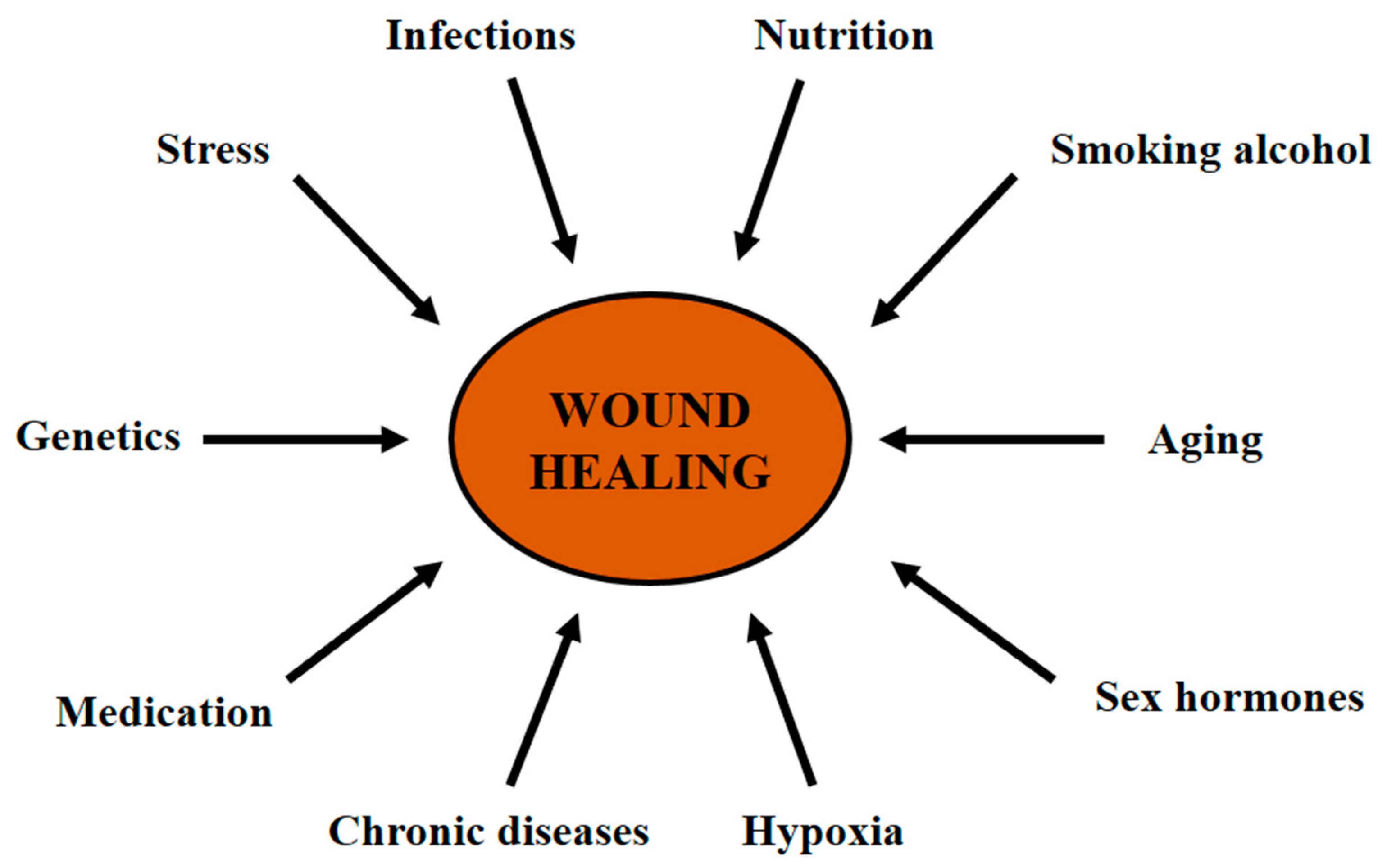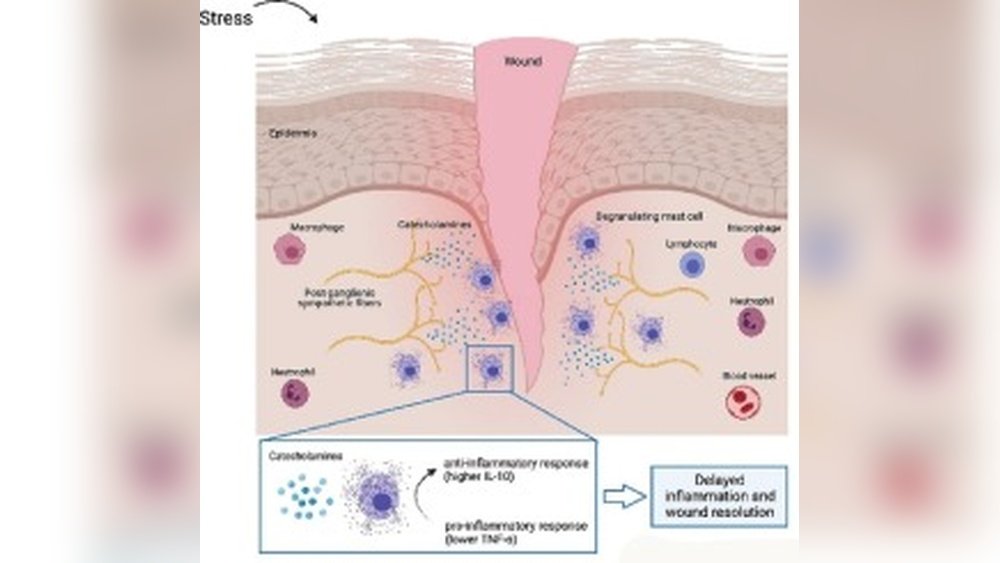Have you ever noticed that a cut or scrape on your skin just doesn’t seem to heal as quickly when you’re stressed out? It’s not your imagination.
Stress can actually slow down the way your skin repairs itself. When your body is under stress, it releases certain hormones that interfere with the natural healing process. This means your wounds might stay open longer, leaving you at risk for infections and discomfort.
If you want to understand why stress affects your skin’s recovery and what you can do to speed up healing, keep reading. Discover how managing your stress could be the key to healthier, faster skin repair.

Credit: www.researchgate.net
Stress Hormones And Skin Repair
Stress hormones play a major role in how skin heals after injury. These hormones affect the body’s ability to repair damaged tissue. Understanding their impact helps explain why stress can slow down skin healing.
When the body faces stress, it releases hormones like cortisol and adrenaline. These chemicals prepare the body to handle a threat but can interfere with normal healing processes. The skin’s repair relies on a delicate balance of cells and signals that stress hormones can disrupt.
How Cortisol Affects Skin Repair
Cortisol is the main stress hormone. It reduces inflammation, which is important to control but also needed for healing. Too much cortisol lowers the immune response. This means fewer white blood cells reach the wound site to fight infection.
High cortisol levels also slow down the production of collagen. Collagen is a protein that helps rebuild skin tissue. Without enough collagen, wounds take longer to close and may heal poorly.
The Role Of Adrenaline In Wound Healing
Adrenaline increases heart rate and blood flow during stress. This can sound helpful but can actually cause problems for skin repair. It may reduce blood supply to the wound by narrowing blood vessels, limiting oxygen and nutrients needed for healing.
Less oxygen slows cell growth and delays the skin’s ability to recover. The body’s focus shifts to immediate survival rather than repair, which slows the healing process.
Stress Hormones And Immune System Impact
Stress hormones weaken the immune system’s ability to respond to injury. They lower the production of chemicals that signal healing cells to move to the wound. This delays the cleaning of damaged tissue and the start of repair.
Immune cells like macrophages and fibroblasts become less active under stress. These cells help remove dead tissue and build new skin. Reduced activity slows wound closure and increases infection risk.

Credit: www.mdpi.com
Immune System And Healing Delays
The immune system plays a key role in skin healing. Stress can weaken this system and slow down recovery. Understanding how stress affects immunity helps explain healing delays.
Stress triggers the release of hormones like cortisol. These hormones reduce the immune system’s ability to fight infection. This leads to slower wound closure and tissue repair.
Stress Hormones And Immune Suppression
Cortisol and epinephrine rise during stress. These hormones lower the activity of immune cells. Reduced immune cells delay the cleanup of damaged tissue. This slows the start of the healing process.
Impact On Inflammatory Response
Inflammation is the first step in healing. Stress disrupts the balance of inflammatory signals. This imbalance causes poor coordination of healing cells. The result is prolonged inflammation and slower wound recovery.
Effect On Healing Cells
Macrophages and fibroblasts repair skin and build new tissue. Stress hormones reduce their numbers and function. Fewer active cells mean less tissue rebuilding. This delay extends the time wounds stay open.
Behavioral Changes Affecting Immunity
Stress often leads to unhealthy habits. Poor sleep and nutrition weaken the immune system further. Smoking and alcohol use increase under stress. These behaviors also slow skin healing by impairing immune defenses.
Behavioral Factors Affecting Recovery
Behavioral factors play a key role in how the skin heals under stress. Stress affects habits that are important for recovery. These habits can either slow down or support the healing process. Understanding these behaviors helps improve skin repair after injury.
Nutrition And Sleep Disruption
Stress often changes eating patterns. People may eat less or choose unhealthy foods. Poor nutrition means the body lacks vitamins and minerals needed for healing. Protein, vitamin C, and zinc are especially important to repair skin.
Stress also disrupts sleep. Sleep is when the body repairs tissues. Lack of sleep reduces growth hormone release. This hormone helps skin cells grow and heal. Without enough rest, wounds take longer to close.
Unhealthy Habits Impact
Stress can lead to smoking, drinking alcohol, or neglecting hygiene. These habits reduce blood flow and oxygen to wounds. They increase inflammation and infection risk. Smoking slows collagen production, which is vital for skin strength.
Alcohol weakens the immune system. It lowers the body’s ability to fight bacteria at the wound site. Poor hygiene can cause germs to enter wounds. This leads to infections and delays healing.

Credit: www.sciencedirect.com
Clinical Evidence On Stress And Healing
Scientific studies reveal how stress influences skin healing. Research shows stress slows the body’s repair process. This happens through changes in hormones and immune responses. Stress also affects behaviors that are important for healing.
Hormonal Changes And Wound Healing
Stress raises cortisol and adrenaline levels in the body. These hormones reduce the activity of immune cells needed for repair. High cortisol slows down inflammation, which is vital in early healing stages. This hormonal imbalance leads to slower tissue regeneration.
Immune System Suppression
Stress weakens the immune system’s ability to fight infection. It lowers the production of important signaling molecules called cytokines. These molecules help control inflammation and repair damaged skin. A suppressed immune system delays wound closure and raises infection risk.
Behavioral Effects On Skin Repair
Stress often causes poor sleep and bad eating habits. Lack of sleep reduces growth hormone release, which is needed for skin repair. Unhealthy nutrition limits the body’s resources to heal wounds. These behaviors add to the negative impact of stress on skin healing.
Clinical Studies On Stress And Healing Speed
Many clinical studies confirm that stress delays wound healing. Patients under psychological stress take longer to heal than those without stress. Increased healing time can cause more complications like infections. Managing stress improves healing outcomes and reduces recovery time.
Stress Reduction For Faster Healing
Stress slows down skin healing by affecting the body’s natural repair process. Reducing stress helps wounds heal faster and lowers infection risks. Simple steps can calm the mind and support the body’s healing power.
Calmness boosts the immune system and helps cells work better. Focus on stress reduction to speed up recovery and improve skin health.
Social Support Benefits
Talking to friends or family reduces stress hormones in the body. Feeling supported lowers anxiety and helps the immune system fight infections. Social connections encourage better habits like eating well and sleeping enough. This support creates a positive cycle that speeds up wound healing.
Joining groups or spending time with loved ones can ease feelings of loneliness. Less stress means the body can focus on fixing skin damage quickly.
Exercise And Stress Management
Regular exercise reduces stress by releasing natural mood boosters called endorphins. Physical activity improves blood flow, bringing oxygen and nutrients to wounds. Better circulation helps cells repair skin faster.
Exercise also improves sleep quality, which is essential for healing. Even light activities like walking can lower stress and support skin recovery. Managing stress through movement aids the body’s natural healing process.
Frequently Asked Questions
Can Stress Make Wounds Heal Slower?
Yes, stress slows wound healing by raising cortisol, disrupting immune responses, and reducing tissue repair. Stress also promotes poor sleep and nutrition, further delaying recovery. Managing stress improves healing speed and reduces complications.
Is Skin Damage From Stress Reversible?
Yes, skin damage from stress can be reversible with proper care. Managing stress and healthy habits promote skin repair and healing.
Why Is My Skin Healing So Slowly?
Slow skin healing often results from stress, poor nutrition, lack of sleep, or underlying health issues. Stress raises cortisol, disrupting immune response and tissue repair. Unhealthy habits and hormonal imbalances further delay recovery. Managing stress and maintaining healthy lifestyle habits improve healing speed and reduce complications.
Can Stress Mess With Your Skin?
Yes, stress disrupts skin health by increasing cortisol, impairing immune responses, and slowing wound healing. Managing stress improves recovery.
Can Stress Slow Down The Skin Healing Process?
Stress releases hormones that weaken immune response and slow tissue repair, causing slower skin healing.
How Does Stress Affect Wound Healing Hormones?
Stress raises cortisol and epinephrine levels, disrupting the balance needed for proper healing.
Conclusion
Stress can slow down how quickly your skin heals. It raises hormones that weaken your immune system and repair cells. Stress also leads to poor sleep and bad habits, which hurt healing. Taking steps to manage stress helps your body recover faster.
Remember, calm mind and healthy habits support better skin healing. Keep stress low to help wounds close and reduce risks. Healing takes time, but less stress makes it easier and safer.
 Skip to content
Skip to content 